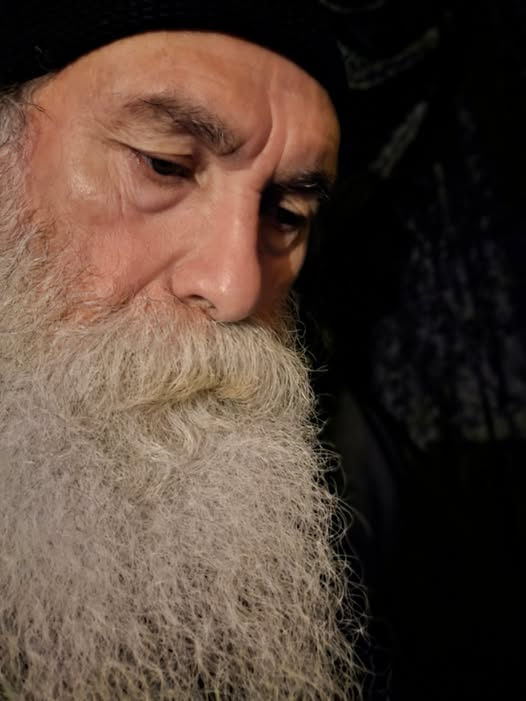That afternoon, thick and dull, descended on Haifa with the impersonality of something that does not want to announce itself. There were no signs in the sky, no resonance in the body. Nothing in the atmosphere suggested what was coming, although perhaps it would be more accurate to say: what was ceasing to resist. I sat down to meditate, as I had done so many times before, without a goal, without urgency, without expecting anything. The gesture was repeated with the monotony of a habit now devoid of intention, but not entirely empty. A certain quiet openness persisted, as if even the accumulated fatigue knew something that consciousness had not yet named. Perhaps it was this absence of expectation that made possible—or at least permissible—the occurrence, the event, the formless happening that ensued. There was no rupture. No image came to redeem me, no concept to bring order. If anything took place, it was a halt, a cessation. A discreet, almost undetectable cessation of that internal pressure that, for years, had structured the experience without my fully noticing it.
It is difficult to pinpoint exactly what stopped. Perhaps it was the compulsion to give shape to the ungraspable. Or the effort, as human as it is exhausting, to fix what constantly slips away. It was not a remedy or a solution. Rather, it was a silent collapse of the very need for meaning. The world outside remained the same, but the perspective, the angle from which I viewed it, had shifted. It was not a change in things, but in the subjective architecture that organized them. Suddenly, the inner narrative—that voice that seeks to give continuity to the figure of the self, which describes itself as an agent, a seeker, an interpreter—unraveled. Without violence, without pathos. It simply lost its cohesive force. It was then evident, without the need for any affirmation, that what I had so often sought was not waiting at the end of any journey. It had not been absent. It had simply gone unnoticed under the weight of the search itself.
To speak of “presence” would be imprecise, though tempting. The term carries echoes of a tradition that, while venerable, is not entirely appropriate here. There was no figure. Nor was there anything that could be seen or thought. What manifested itself—if that word can still be used—had no form or location. It demanded no attention, offered no confirmation. There was no distinction between the observer and the observed. That inherent dichotomy had simply ceased to operate. It was not a conceptual synthesis, but a silent erosion of the need for separation. For a timeless moment, life seemed to be sufficient unto itself, with no narrative to shape it and no subject to frame it.
To call this state “fulfillment” would be misleading. Not for lack of serenity, which was undoubtedly there, but because the term implies a totality that was never at stake. It was not a culmination, nor a spiritual climax. There was no definitive understanding, no promise fulfilled. What occurred was an unemphatic nakedness, a way of being in which it was no longer necessary to sustain the world through effort. Nothing was added. The habitual gesture that framed it simply ceased. And in that suspension, without conquest or proclamation, an unexpected freedom emerged. Not the kind that is defended or affirmed as a principle, but another: discreet, without attributes, unarticulated. A freedom that is not obtained or declared. One that occurs when thought ceases to occupy center stage.
Even today, I still have an image of what followed: a walk with no destination, accompanied by a happiness without cause. There was no one to direct it to, no thing to motivate it. It was tenderness without direction, without object. It demanded no understanding, no confirmation. Even the need to understand that there was nothing to understand had vanished. In its place was a wordless evidence that was neither knowledge nor illusion. A form of clarity that was neither conceptual nor discursive. It was not a matter of seeing something new, but of ceasing the impulse to verify, define, or determine. And in that abandonment—more than in any apparition—an unusual lightness was hinted at. A lucidity that was not conquered, but rather willing.
Almost thirty years have passed. There is no nostalgia. Not because what was experienced lacks value, but because it is not found in the past. It does not belong to a “place,” nor can it be replicated through practice. It cannot be recovered. That moment was not fixed in time; it remains among common gestures, in the barely perceptible. In the pause before a word, in the space that precedes a reaction, in the simple act of not responding. That is enough. And if I ever got lost, I would not try to find my way back. Because no path leads to that availability. Access does not depend on movement, but on stopping, on ceasing. Not on reaching, but on interrupting.
What we are—if that expression still deserves to be used—does not wait in the future, nor is it built with effort. It is not the goal of a process, nor the conclusion of a search. It does not hide behind a test. It does not demand revelation. It is what has always sustained, without showing itself, every attempt to find it. It is not found. It is. And it has always been. Although we often forget that we never strayed.”
Prabhuji




